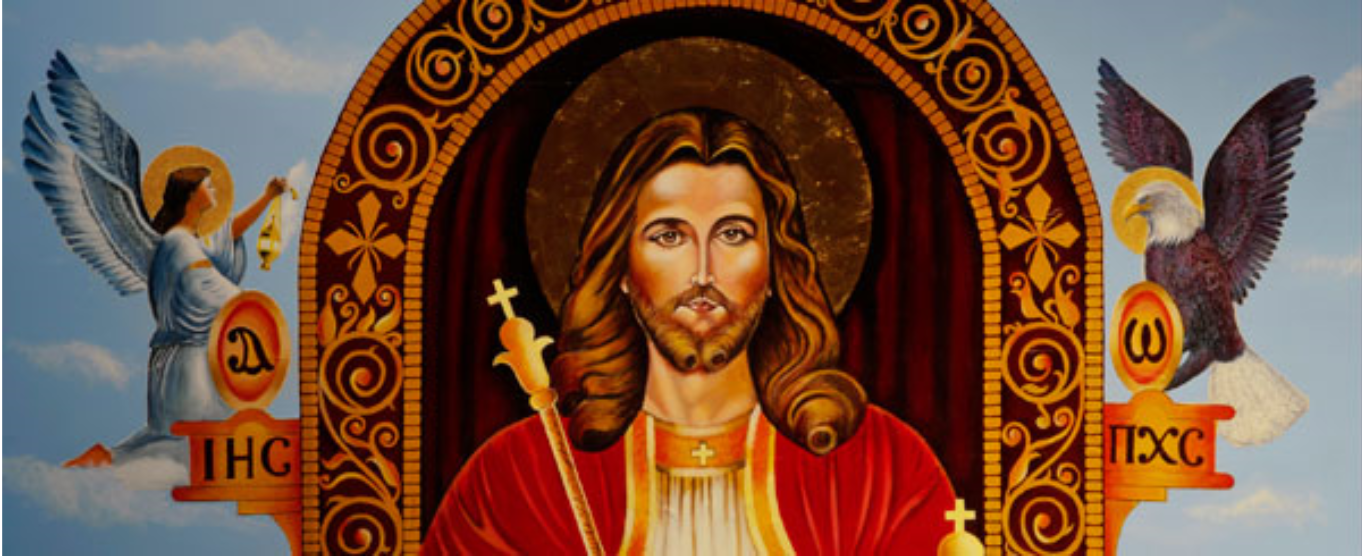English Books for the Intrepration of the Holy Bible
(According to the Coptic Orthodox Teachings)
First and foremost, the church believes that the Bible is the inspired word of God, to be followed according to the interpretation of the early church fathers.
The Orthodox Church believes in the moderate way without any exaggeration, for she holds fast the church tradition that organizes the church life, clarifies the principal concepts of worship and reveals the spirit of the Holy Bible without canceling the personal relationship of every member of the church with his Savior.
Besides the personal understanding of the Bible, and enjoying freedom, the Orthodox Church sanctifies the church thoughts as a community and at the same time appreciates the personal life of every member of the Church.
From the Book of "Introduction of the Coptic Church, the blessed Father Tadros Malaty, the great scholar of the Bible and Patristic and other Church sciences writes:
THE HOLY BIBLE AND THE ALEXANDRIAN CHURCH
Since her inception, especially starting from the second century, the Alexandrian Church has been known for her School which concentrated on the study of the Holy Bible and was interested in its allegorical interpretation. This method of interpretation was received by Origen from his teacher, St. Clement, and from his predecessors.
1. The School of Alexandria paid attention to science and philosophy, and therefore did not show any hostility towards philosophers, on the contrary, for some of the churchmen were students in the philosophical School "the Museum" and they attracted many of its leaders - the philosophers - to Christianity. Yet at the same time the School of Alexandria did not look to the Holy Bible with a philosophical view for mere satisfaction of the mind, or for the sake of arguments and debates.
The Church looked at the Bible as the experience of meeting with the Word of God and a true enjoyment of the Holy Trinity's work in the life of the community and in the life of each member therein. According to the Alexandrian thought the soul enters - through the spirit of prayer and piety - into the presence of God that He might raise her above the deadly literal meaning, ascends her to His heavenly chamber, and reveals to her His divine mysteries which cannot be expressed in human language.
Thus the Holy Bible in its essence is a discovery of the incarnate Word of God, our Lord Jesus Christ, who is hidden behind its words, who leads us to experience the communion with the Father through Him, by the Holy Spirit. In other words, studying and meditating on the Holy Bible is a spiritual worship and an enjoyment with the Holy Trinity, as we experience our sonship to the Father and His Fatherhood to us, our steadfastness in the Only Begotten Son and the attainment of the fruit of the Holy Spirit.
Church life is not only a life of worship in an evangelic way or a biblical life in a spirit of worship, but it is one, inclusive and integral life, which includes the practical daily life with good behaviour, the ascetic practice and the desire of the heart to witnessing and preaching. In other words, our Bible study is worship, practical behaviour, asceticism and preaching. Truly some members may be gifted in depth with certain talents. For example some may be involved in studying the Bible, others in practising asceticism, and others in preaching etc., yet all members have to live in the one whole spirit in order not to deviate from the aim of the Bible and the spirit of the church.
تفاسير الانجيل المقدس
(حسب تعليم الاباء و الكنيسة القبطية الارثوذوكسية)
التسليم هو الطريقة التي فهم به الآباء معنى الإنجيل، وتفاصيل العقيدة. وقد سلّموها لنا كما استلموها من آبائهم، ومن السيد المسيح نفسه.
* إنه تسليم "ليس بحسب إنسان" (غل1: 11).. وليس من اختراع البشر، أو استحسان المفكرين واللاهوتيين..
* "فإنني سلَّمت إليكم في الأول ما قبلته أنا أيضًا" (1كو15: 3)، "لأنني تسلَّمت من الرب ما سلَّمتكم أيضًا" (1كو11: 23).
وقد أمرنا الإنجيل أن نحفظ هذه التقليدات ونسلمها بأمانة للأجيال التالية.
* "فأمدحكم أيها الإخوة على أنكم تذكرونني في كل شيء، وتحفظون التعاليم (التقليدات) كما سلَّمتها إليكم" (1كو11: 2).
* "فاثبتوا إذًا أيها الإخوة وتمسكوا بالتعاليم (التقليدات) التي تعلمتموها، سواء كان بالكلام أم برسالتنا" (2تس2: 15).
الأسفار نفسها تشهد إذًا بأنها يجب أن تُفهم من خلال التسليم الرسولي "نوصيكم أيها الإخوة، باسم ربنا يسوع المسيح، أن تتجنبوا كل أخ يَسلُك بلا ترتيب، وليس حسب التعليم (التقليد) الذي أخذه منا"
(2تس3: 6).
هذا التعليم الرسولي كان جزء منه كتابة في الرسائل، وجزء آخر شفاهي "لأني أرجو أن آتي إليكم وأتكلم فما لفم، لكي يكون فرحُنا كاملًا" (2يو12)، راجع أيضًا (3يو13،14)، وجزء منه كان ترتيبات عملية "وأما الأمور الباقية فعندما أجيء أرتبها" (1كو11: 34).
وقد أوصى الكتاب المقدس الكنيسة أن تحفظ هذا التسليم، وتسلِّمه بأمانة وكفاءة للأجيال المتعاقبة..
* "وما سمعته منى بشهود كثيرين، أَودِعه أُناسًا أُمناء، يكونون أكفاءً أن يُعلِّموا آخرين أيضًا" (2تي2: 2).
* "من أجل هذا تركتك في كريت لكي تُكمِّل ترتيب الأمور الناقصة، وتُقيم في كل مدينة قسوسًا" (تي1: 5).
* "تمسّك بصورة الكلام الصحيح الذي سمعته مني" (2تي1: 13).
لقد فهم الآباء الإنجيل بطريقة سليمة حسب قصد السيد المسيح. فكان إيمانهم نقيًا، وكذلك عاشوا بالإنجيل كما قصد السيد المسيح.. فكانت حياتهم تقوية. "وما تعلمتموه، وتسلمتموه، وسمعتموه، ورأيتموه فيَّ، فهذا افعلوا" (في4: 9).
ولولا هذا التسليم.. لتعددت مدارس التفسير إلى الدرجة التي تنشأ بسببها الهرطقات والبدع الخطيرة بسبب الاجتهاد الشخصي في التفسير، وتدخّل العوامل النفسية والشخصية في توجيه معنى الآيات.
كثير من الآيات التي إذا فُهمت بطريقة حرفية لضاع المعنى الذي يقصده السيد المسيح، وأخرى عسرة الفهم تحتاج شرحًا وتفسيرًا سليمًا، وأخرى لم يفهمها البعض فهمًا صحيحًا فأدت إلى ظهور الهرطقات والبدع الخطيرة.
إن العودة إلى التسليم الرسولي هي أضمن السُبل للاحتفاظ بالفهم السليم لنصوص الكتاب المقدس.
ما أخطر أن يعتمد الإنسان على نفسه وعلى فكره الخاص "وعلى فهمك لا تعتمد" (أم3: 5). "لا تكونوا حُكماء عند أنفسكم" (رو12: 16). "وأما أنت فاثبُت على ما تعلَّمت وأيقنت، عارفًا مِمَّنْ تعلَّمت" (2تي3: 14).
إذًا ليست الأهمية أن نقرأ الإنجيل فقط.. بل أيضًا أن نستنير بالكنيسة في فهم الإنجيل، والسلوك بالوصية. وهذا ما هو حادث بالفعل في كنيستنا القبطية.. إذ هي متمسكة بالكتاب المقدس، وأيضًا بالطريقة التي فهمه بها الآباء.
دعونا نتمسك بـ "الإيمان المُسلَّم مَرَّة للقديسين" (يه 3).
"تمسك بصورة الكلام الصحيح الذي سمعته مني، في الإيمان والمحبة التي في المسيح يسوع. احفظ الوديعة الصالحة بالروح القدس الساكن فينا" (2تي1: 13-14).
إن ما لدينا من تسليم رسولي وآبائي قد حافظت عليه كنيستنا القبطية بكل نقاوة وأمانة، وسلّمته إلينا بكل دقة وتقوى. وقد بذلت الكنيسة دمها وعرقها حبًا لفاديها وعريسها، وحفظًا لتراثها وسلامة إيمانها.
فإذا أردت أن تستند إلى شرح إلهي مستنير، وتفسير أمين غير منحرف وبدون شهوات خاصة.
تعالَ إذًا إلى كنيستك القبطية الأرثوذكسية لتغترف من كنوز معرفتها لتشبع وتفرح وتسعد بالمسيح إلهنا.
"لأن وعظنا ليس عن ضلال، ولا عن دنس، ولا بمكر، بل كما استُحسنا من الله أن نُؤتمن على الإنجيل، هكذا نتكلم، لا كأننا نُرضي الناس بل الله الذي يختبر قلوبنا. فإننا لم نكن قط في كلام تملق كما تعلمون، ولا في علة طمع. الله شاهد" (1 تس2: 3-5)

NewTestament
The Epistle of St Paul to the Romans
The Epistle of St Paul to the Philipians
The Epistle of St Paul to the Hebrews
The Epistle of St Paul to Titus
The Epistle of St Paul to the Galatians
The Epistle of St Paul to the Philemon
The Epistle of St Paul to the Thessalonians I
The Epistle of St Paul to the Thessalonians II
Introduction and Interpretations of the Bible
Books of the Bible - Coptic Orthodox Interpretations
(This section is based on www.coptics.info web site. A special thanks to their efforts)
Coptic Orthodox Bible Study
Old Testament
Five Books of Moses
Genesis
Exodus
Leviticus
Numbers
Deuteronomy
Historical Books
Joshua
Judges
Ruth
1 Samuel
2 Samuel
1 Kings
1 Chronicles
2 Chronicles
Poetic Books
Job
Psalms
Proverbs
Ecclesiastes
Song of Songs
Major Prophets
Isaiah
Jeremiah
Lamentations
Ezekiel
Daniel
Minor Prophets
Hosea
Joel
Amos
Obadiah
Jonah
Micah
Nahum
Habakkuk
Zephaniah
Haggai
Zechariah
Malachi
New Testament
The Four Gospels
The Book of Acts (Ipraxis)
Acts
Letters of Saint Paul the Apostle
Romans
1 Corinthians
2 Corinthians
Galatians
Ephesians
Philippians
Colossians
1 Thessalonians
2 Thessalonians
1 Timothy
2 Timothy
Titus
Philemon
Catholic Epistles
1 Peter
2 Peter
1 John
2 John
3 John
Hebrews
James
Jude
Book of Revelation
Revelation
The Deuterocanonical Books
- Introduction to The Deuterocanonical books
- COMMENTARY ON THE HOLY BOOK OF DEUTERONOMY
- Deuterocanonical books: Introduction to the Coptic Orthodox Church. By Dr. Murad Kamel
- The Book of Tobias
- The Book of Judith
- The Book of Esther
- The Book of Wisdom of Solomon
- Wisdom of Joshua son of Sirach
- The Book of Baruch
- The Book of Daniel.pdf
- The First Book of the Maccabees
- The Second Book of the Maccabees
- Psalm 151


